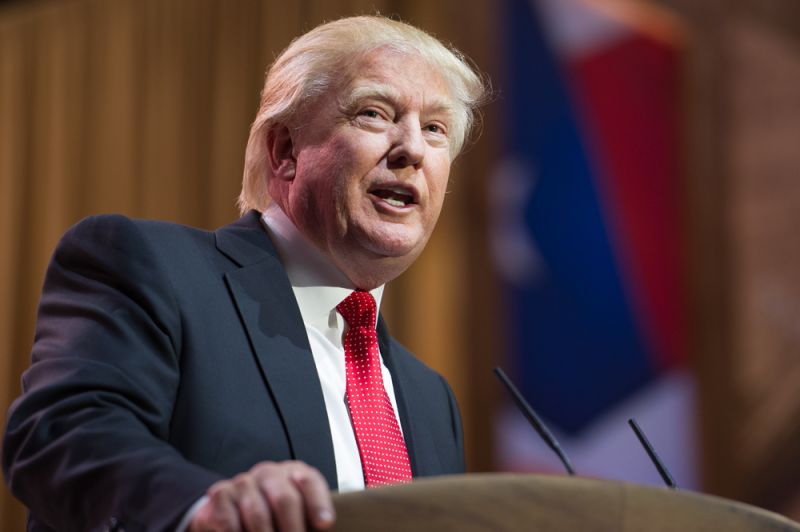Donald Trump defeated Hillary Clinton in a shocking election upset Tuesday Nov. 8, becoming the 45th president elect of the United States of America. The Republican nominee won necessary victories in key battleground states such as Florida, Ohio and North Carolina, while also managing to flip the Democratic strongholds of Pennsylvania, Michigan, and Wisconsin.
“Now it’s time for America to bind the wounds of division. We have to get together,” Trump said during his victory speech. “To all Republicans and Democrats and independents across this nation, I say it is time for us to come together as one united people.”
Prior to his taking the stage, Clinton delivered a somber concession speech to her supporters and workers at her own campaign headquarters, which began with the simple words: “I’m sorry.”
“This is not the outcome that we wanted and we worked so hard for, and I am sorry that we did not win this election,” Clinton said. “Last night, I congratulated Donald Trump and offered to work with him on behalf of our country. I hope that he will be a successful president for all Americans.”
Despite the vitriol of the two campaigns, both candidates paid respects to the other’s effort and determination.
“Hillary has worked very long and very hard over a long period of time, and we owe her a major debt of gratitude for her service to our country,” Trump said. “I mean that very sincerely.”
Trump’s victory came as a surprise for many as most polls had indicated Clinton would have no problem carrying the traditional Democratic bulwarks and would remain competitive in battleground states of Florida and North Carolina.
While Clinton was able to carry New Mexico and Nevada, it was not enough to compensate for Trump’s push in the East.
His ability to put Midwestern blue states into play spoke to his campaign’s unconventionality and his rejection of establishment politics. The Republican nominee had said for months to watch Pennsylvania and Michigan, where he would make his victory.
Since early in his campaign, a major focus of his platform was his promise to crack down on foreign trade violators and bring manufacturing jobs back to the so-called Rustbelt. He spent more time campaigning in these states than Clinton, something many other Republicans considered foolhardy.
In the end his strategy paid off, and it seems that whatever else Trump is, he is a smart gambler.
Here in Ohio, Trump carried the state with 2,771,984 votes (52 percent) to Clinton’s 2,317,001 (44 percent). As expected, rural counties went for Trump while the more urban went for Clinton.
In Ohio’s race for U.S. senate, incumbent Rob Portman (Rep.) defeated former Ohio Gov. Ted Strickland (Dem.), with 3,048,467 votes (58 percent) to Strickland’s 1,929,873 (37 percent).
The Republican party won a majority in both the House and Senate, with 239 representatives and 51 senators to the Democrat’s 192 and 48 respectively. While not a supper majority, these victories will assist Trump when he assumes the presidency in January.
Differences in turnout and enthusiasm between supporters of Trump and Clinton likely contributed to his ability to not only put traditionally solid blue states into play, but to win them.
Election predictors had underestimated the turnout of uneducated white men, Trumps key demographic, while overestimating the turnout of demographics that lean Democrat. It is likely that Trump also received votes from many who had remained undecided until the final days of the race, or otherwise not publicly acknowledged their support for him.
“As I’ve said from the beginning, ours was not a campaign, but rather an incredible and great movement made up of millions of hard-working men and women who love their country and want a better, brighter future for themselves and for their families,” Trump said. “We must reclaim our country’s destiny and dream big and bold and daring. We have to do that.”
His victory demonstrates the power of his populist, anti-establishment message, which resonated with so many Americans who feel that their country has left them behind. Many of his supporters were first time voters who had mostly written off politics prior to his campaign.
The uncertainty of his presidency however, has caused drops in global markets. Many foreign governments and media outlets were shocked by the election’s outcome and the potential implication of his presidency abroad.
Trump briefly addressed such concerns in his victory speech.
“I want to tell the world community that while we will always put America’s interests first, we will deal fairly with everyone, with everyone: all people and all other nations,” Trump said. “We will seek common ground, not hostility; partnership, not conflict.”
In contrast with many of his comments during the campaign and his reliance on a largely homogeneous base of supporters, Trump pledged to be president for all Americans.
“For those who have chosen not to support me in the past, of which there were a few people,” he said. “I’m reaching out to you for your guidance and your help so that we can work together and unify our great country.”
Only time will tell how Trump will govern, or whether his behavior will become “more presidential” now that he has won the presidency.
He is set to be sworn in on Jan. 20.
This story was updated Nov. 10 at 2:07 a.m.

